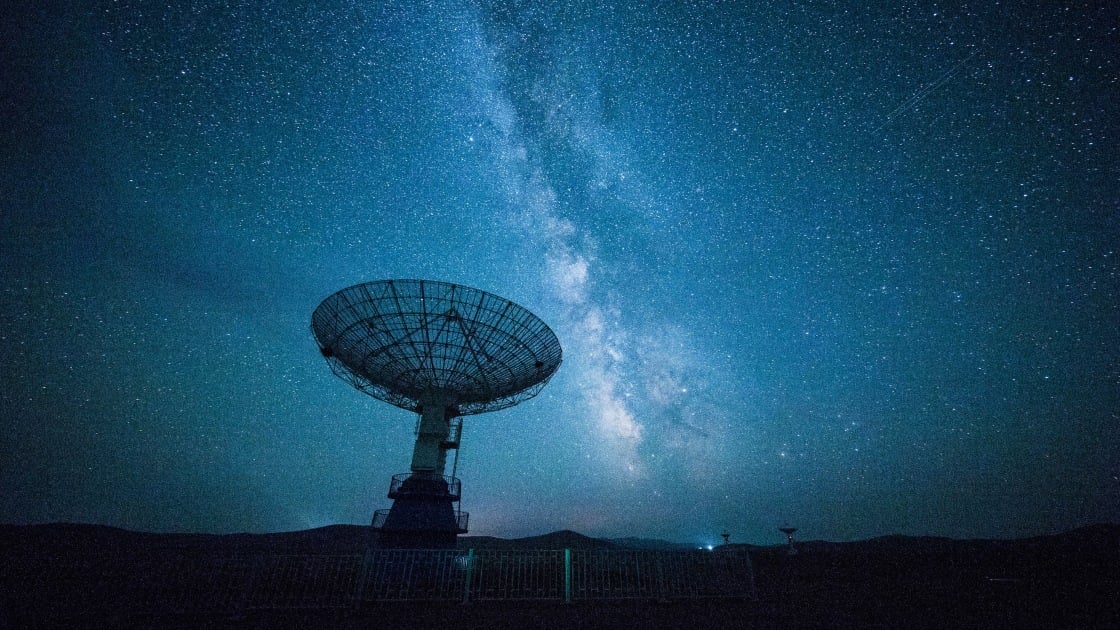SpaceX and AST SpaceMobile are working to bring satellite connectivity to smartphones, but scientists say the technology threatens to disrupt radio astronomy.
“The proposed direct-to-cell satellites would effectively eliminate the existence of radio silence zones, significantly reducing the effectiveness of existing radio telescopes,” said Catherine Lovekin, associate professor of physics at Mount Allison University in Canada.
Lovekin is among scientists and groups urging the FCC to regulate cellular satellites from interfering with radio astronomy equipment. The satellites effectively act as cell towers in low Earth orbit, directing radio signals and Internet data to phones on the ground.
SpaceX and AST SpaceMobile plan to operate hundreds of direct-to-cell satellites to help carriers like T-Mobile and AT&T serve users in dead zones. But a growing number of astronomers and scientists say continued radio interference from so many satellites poses an “existential threat” to radio astronomy.
BlueWalker satellite (Credit: AST SpaceMobile)
In its letter to the FCC, the American Astronomical Society says scientists have made important discoveries through radio astronomy precisely because they had “clear access to the broad radio spectrum, either through the establishment of a radio silence zone or through the placement of observatories in remote locations.” .
“This will no longer be possible with persistent interference from satellite transmissions. Without access across the broader spectrum, astronomical research will only be possible in the small patch of spectrum allocated specifically for this purpose, significantly limiting the discovery potential.” warned the association, which has more than 7,700 members.
Astronomers are speaking out after the FCC approved new rules in March that allow satellite providers to broadcast connectivity to consumer phones. But in doing so, the committee said it was also acutely aware of concerns about interference, including radio astronomy. That’s because a month earlier the National Science Foundation, an independent federal agency, published a white paper devoted to studying the issue.
“NSF’s preliminary analysis indicates significant impacts on radio astronomy systems,” the white paper said, citing the “power levels and ubiquitous airborne visibility” of such satellite systems. The document also warns that radio signals from the satellites “can even damage radio astronomy hardware” if a satellite’s transmitter passes directly in front of a radio astronomy receiver.
“While it is possible that the severity of damage to radio astronomy can be mitigated with careful coordination and selection of the absolute minimum bandwidths and power levels required for any permitted SCS, radio astronomy will be negatively affected in any deployment scenario,” the statement said. NSF. went on to say.
Recommended by our editors
(Photo by Paul Hennessy/NurPhoto via Getty Images)
SpaceX and AST SpaceMobile did not immediately respond to a request for comment, although both said they have been working with the astronomy community on solutions to prevent interference with scientific research. Yet an important question is whether cellular satellite technology can coexist with radio astronomy, or whether one comes at the expense of the other.
In the meantime, the scientists lobbying the FCC are urging the FCC to require companies like SpaceX and AST SpaceMobile to prove that their technologies will not interfere with radio astronomy before they receive commercial approval. This includes demonstrating “their ability to operate without directly illuminating, disabling, or damaging radio astronomy observatory receivers,” the National Radio Astronomy Observatory said in its own filing.
It is not the first time that astronomers have expressed concerns about large satellite constellations. In recent years, they have also criticized satellites from SpaceX and AST SpaceMobile for bombarding their observations or emitting too much light into the night sky.
To date, the FCC has not authorized SpaceX or AST SpaceMobile to commercially operate their mobile satellite systems. Scientists and astronomy groups are lobbying the FCC after it opened a public comment period on the new rules for mobile satellite coverage, which also seek to minimize the risk of interference.
Receive our best stories!
Sign up for What’s new now? to get our top stories delivered to your inbox every morning.
This newsletter may contain advertisements, offers or affiliate links. By subscribing to a newsletter you agree to our terms of use and privacy policy. You can unsubscribe from the newsletters at any time.

